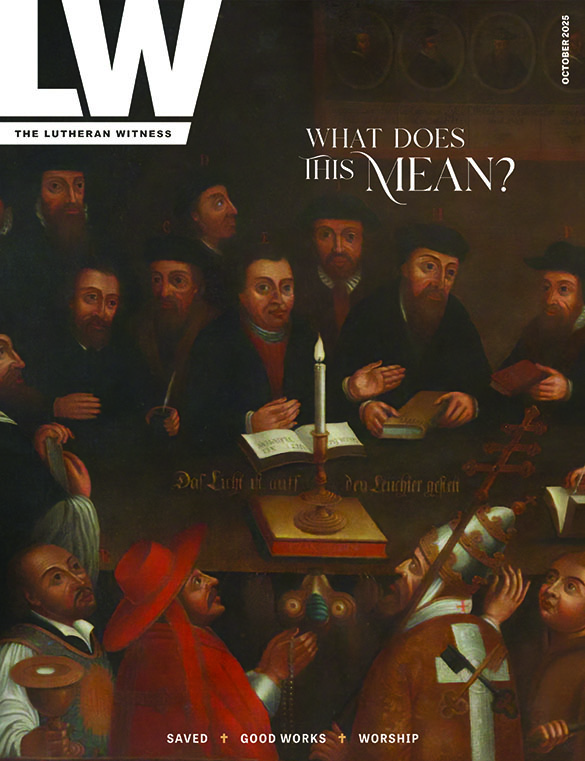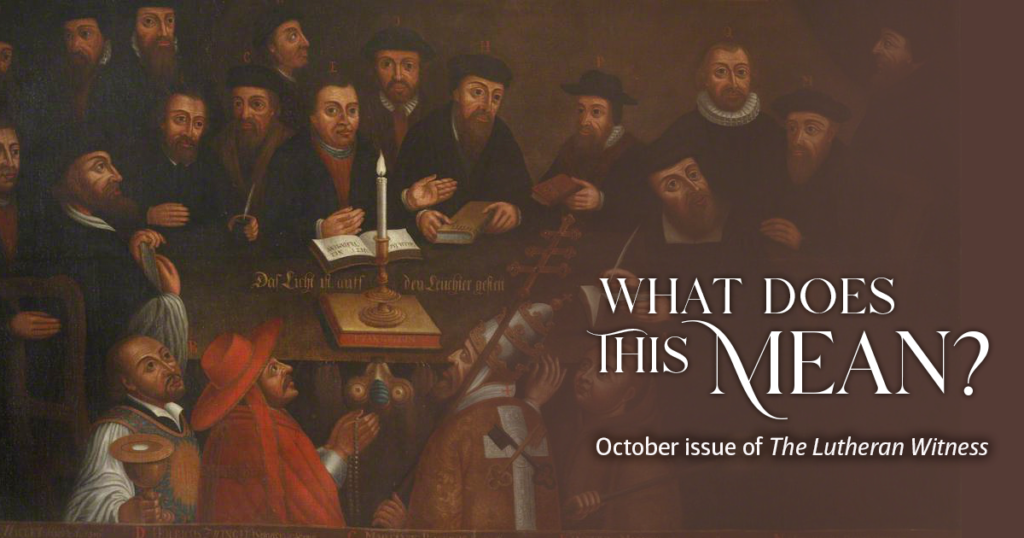
The October issue provides definitions and explanations of nine different words we use often as Lutherans — and unpacks how other denominations use those terms differently.
- From the President: The Kingdom of Heaven Suffers Violence
- Life in the Church Year: Reformation Day: Lutheran Celebration and Reformationbrötchen
Features:
- “Faith” — The gift of knowledge, assent and confidence
- “Grace” — The gift of mercy and forgiveness
- “Saved” — Set free and declared righteous
- “Repentance” — Contrition and faith
- “Inspiration” — The Holy Spirit’s words
- “Good Works” — Actions in accordance with God’s will
- “Worship” — God comes to us
- “The Church” — The entirety of all believers
- “Pastoral Ministry” — An office instituted by Christ
Departments:
- Snippets: News from around the LCMS and the world
- Worship: The Felicitous Consistency of the Agnus Dei
- Formula of Concord Reading Plan: October — Church Practices
- Searching Scripture: Opening the Old Testament: Do Lutherans Do Allegory?
From the editor:
A couple of months ago, the Evangelical Lutheran Church in America (ELCA) decided in convention to recommend that the filioque (the statement that the Holy Spirit proceeds “from the Father and the Son,” over which the Eastern and Western churches divided nearly a millennium ago) be omitted from the recitation of the Nicene Creed to foster “healing of age-old divisions” with Eastern Orthodox Christians.
What’s in a word, anyway? Centuries ago, wars were fought over them. Long treatises and public disputations explored them and argued bitterly over them. People were put to death over them. From the vantage point of our culture, this level of commitment to specific language and careful definition may seem impressive or horrible — but it certainly seems foreign.
Of course, language has limits. Words break down. As we see daily in our lives and relationships, human words will only ever be a rickety bridge between self and others. However, just as our God came into human flesh to redeem it, He has redeemed human language by giving us His Word, Holy Scripture, which is unlike any other human words: It will stand forever, it is unchanging, and it is sufficient to give us all the knowledge and understanding we need of God and ourselves.
So, when it comes to theology, words and their definitions are crucially important. More specifically, it is crucially important that the words we use, and the way we understand them, are drawn from and grounded in Holy Scripture.
This issue walks through some of the words that are very common in our parlance as Lutherans — “faith,” “saved,” “grace,” “worship,” “inspired” and the like — and lays out how we define them, based on the teachings of Scripture. Then, it unpacks how other denominations use the same terms. A special word of thanks to Richard Serina, Daniel Grimmer, Michael Frese, Angus Menuge, Armand Boehme, Sarah Hjulberg and Molly Lackey for their help in researching and compiling these articles.
We hope this month’s issue can be a resource to you as you approach conversations with Christians of other denominations or read or listen to their theology; so that when you hear a Christian say, “We are saved by grace through faith,” or “Scripture is God’s inspired Word,” you can unpack where that person’s view may still differ from yours.
When we point out these differences, as the Rev. Sean Daenzer writes in his Worship column this month (p. 23), we do not mean to suggest that only Lutherans are true Christians, or that no one in any other church body has genuine saving faith. Thanks be to God, through the Word read in the service, sung in hymns and songs, and imbedded in liturgies, “despite the errors in their church’s official teaching, those in the pews are still often brought to faith and truth. … Happily, the Word of God is not bound. It still convinces many to believe what it says, whatever else is said beside it.”
Thanks be to God for His eternal Word, under which we must always sit humbly, with prayers that He would work in our hearts and in the hearts of all who hear it.
In Christ,
Stacey Eising
Managing Editor, The Lutheran Witness




